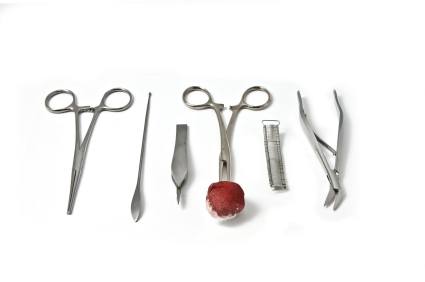Search
Never Event #6: Foreign Objects Left In During Surgery
Incidents involved foreign objects left inside the body during surgery are common occurrence. Statistics from The New England Journal Of Medicine show that most large hospitals will have at least one incident per year where a surgical teams leaves surgical equipment behind. The most common item left inside body cavities are surgical sponges. Even larger items have been left inside the body cavity including: scalpels, scissors, tweezers, needles and even parts to a drill. 
Surgeries that require opening of the chest or abdomen have a higher likelihood for the hospital staff leaving foreign objects behind. There are similar increases in the number of incidents in emergency surgeries, unplanned changes during surgery and in people with higher body mass indexes.
Foreign objects left in the body may remain relatively quiet for years before they are discovered. Once discovered these foreign objects usually need to be removed. Foreign objects may become dislodged and cause major injuries such as sepsis, infection, internal bleeding and death.
Why Are Foreign Objects Left During Surgery On The ‘Never List’?
Leaving a foreign object in the body during surgery is the result of a sloppy surgical staff. All members of the operative staff have a responsibility to the patient to assure that all surgical equipment is removed following the procedure. Hospitals should have preventative policies in effect to reduce or avoid incidents involving foreign objects left in the body:
- Mandatory surgical sweeps including a visual and manual inspection of the operative area
- Double counts of all surgical supplies
- Use of x-ray detectable items in the surgical wound
- Take x-rays where there is an inability to count the surgical supplies or there is a discrepancy in the count numbers
 Nursing Home Law News
Nursing Home Law News

